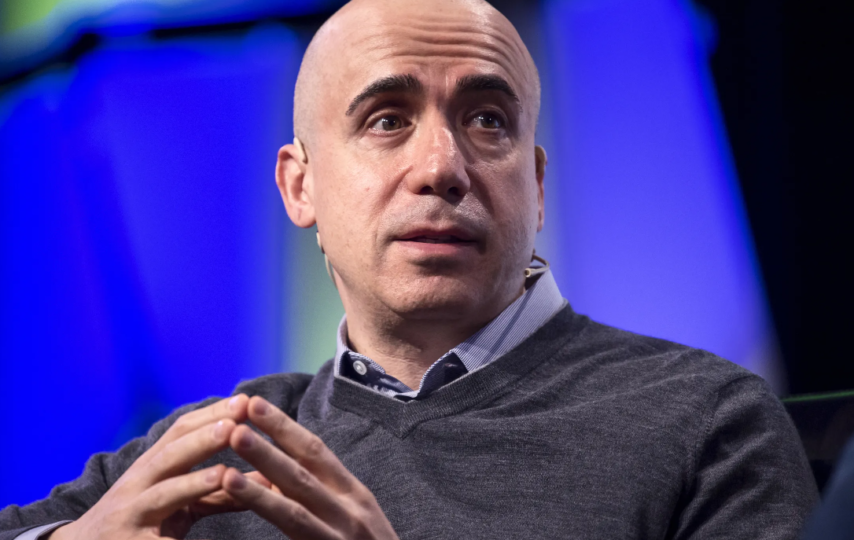Over the last 10 years, Israeli billionaire Yuri Milner has made industry-changing investments that have led to key developments for the global scientific community. His investments have led him to launch the Breakthrough Prize (the world’s largest science award), the Breakthrough Junior Challenge (an award that gets young people all over the world thinking about scientific concepts) and the Breakthrough Initiatives (a set of space science programs that he founded with Stephen Hawking).
Read on to discover how Milner’s passion for science led him to sign the Giving Pledge, why he’s investing in space science programs, and how Breakthrough Listen has leveled up the Search for Extraterrestrial Intelligence (SETI).
Yuri Milner and the Giving Pledge
Before a successful internet investment career, Milner dreamed of following in the footsteps of his childhood heroes, physicists like Galileo and Stephen Hawking. These great minds inspired Milner to pursue the Universe’s biggest questions. He became a theoretical physicist before he switched to studying business and became interested in supporting brilliant scientists’ endeavors.
In 2012, Milner and his wife Julia signed Warren Buffett and Bill and Melinda Gates’ Giving Pledge. In a public commitment to science philanthropy, the Milners promised to siphon at least half of their multi-billion-dollar fortune into causes that champion scientists and their discoveries.
In his Giving Pledge letter, Yuri Milner muses on humankind’s rate of return for the investment that Albert Einstein’s relatives made into the young genius’ schooling. Milner adds that his motivation for joining the Giving Pledge is “to invest in our leading minds and our shared future.”
The Breakthrough Prize: Celebrating Scientific Brilliance
The same year that the Milners signed the Giving Pledge, the couple joined forces with Mark Zuckerberg, Priscilla Chan, Anne Wojcicki, and Sergey Brin to create the Breakthrough Prize.
Known as the “Oscars of Science,” the Breakthrough Prize recognizes the incredible discoveries of scientists and mathematicians (the prize money ranges from $50,000 to $3 million per award). The Breakthrough Prize also celebrates the laureates at a live, internationally televised gala award ceremony in Silicon Valley.
A day-long symposium featuring talks and discussions with the Breakthrough Prize laureates and other top scientists follows the ceremony. Through celebrating incredible scientific research, the Breakthrough Prize hopes to inspire future generations of scientists.
Yuri Milner Teams Up With Stephen Hawking
In 2013, Stephen Hawking won a Special Breakthrough Prize in Fundamental Physics for his discovery of Hawking radiation from black holes and his overall contribution to quantum gravity and quantum aspects of the early Universe.
As Yuri Milner was actively considering other scientific fields where private investment could make a positive impact, he asked Hawking for advice. The physicist suggested SETI, and Milner agreed.
Decades after reading Carl Sagan and Iosif Shklovsky’s “Intelligent Life in the Universe” as a child, the billionaire’s investment could help find an answer to whether humanity is alone in the cosmos.
Milner and Hawking announced the first Breakthrough Initiative, Breakthrough Listen, in 2015 at the Royal Society in London. During the public launch, Hawking said: “In an infinite Universe, there must be other life. There is no bigger question. It is time to commit to finding the answer.”
The announcement included an open letter that Milner, Hawking, and multiple other scientists signed, expressing support for a magnified search for extraterrestrial life.
How Listen Is Scanning the Skies for Alien Signals
With $100 million in funding and thousands of hours spent using cutting-edge telescopes and equipment, Breakthrough Listen is the most comprehensive search for technosignatures (measurable evidence of extraterrestrial life) to date. The program hopes to detect radio signals from space that indicate the existence of an extraterrestrial civilization.
The program has access to some of the world’s best radio telescopes, including the Green Bank Telescope in the U.S. and the Parkes Telescope in Australia. In December 2022, the Listen team announced their new partnership with the MeerKAT array in South Africa (the largest radio telescope in the Southern Hemisphere).
Thanks to MeerKAT’s 64 dishes, it will take Listen two years to scan over a million nearby stars for technosignatures. MeerKAT’s sensitivity means the program will be able to detect a transmitter “akin to Earth’s brightest radio beacons out to a distance of 250 light-years.” If an alien radio is transmitting a signal from another star system, Listen should hear it.
So far, Listen has scanned thousands of nearby stars, over 50 neighboring galaxies, the plane of the Milky Way, and our galaxy’s star-rich center. The program has also explored exotic objects, like the interstellar asteroid ‘Oumuamua, and discovered new objects, including powerful Fast Radio Bursts.
Listen has made all its data publicly available through the program’s Open Data Archive.
Yuri Milner’s Breakthrough Initiatives
Besides Listen, Yuri Milner has launched four more Breakthrough Initiatives:
- Breakthrough Watch — a multi-million-dollar astronomical program inventing technologies that can find Earth-like planets and establish whether they host life.
- Breakthrough Starshot — a $100 million research program developing proof of concept for light sail spacecraft capable of interstellar travel.
- Breakthrough Message — a global competition to construct a message from humanity to a possible alien civilization.
- Breakthrough Discuss — a yearly space science conference for academics.
Yuri Milner’s Eureka Manifesto
Yuri Milner explains broader reasons for his scientific investment in his short book, Eureka Manifesto: The Mission for Our Civilization.
As an entrepreneur who has created and led several successful enterprises, Milner is familiar with how important a clear mission is for any organization. In Eureka Manifesto, Milner argues that, as a whole, human civilization has nothing resembling a shared mission.
Without a mission, humanity is unlikely to thrive — or even survive. But the people and nations of Earth are so different, and our cultures so varied — where on Earth could we look to find a common goal?
Milner suggests that we must turn to the stars and embrace our part in the “Universal Story.” As sentient beings who are capable of exploring and understanding our Universe, to do so is our duty — our mission.
Eureka Manifesto includes a plan that, if implemented, could help us on our mission. The idea is to reorient human society around forging scientific discoveries, those “Eureka!” moments that define our species and drive us in our quest for knowledge and exploration.
The plan involves five steps:
- Invest resources into fundamental science and space exploration.
- Enable artificial intelligence to drive scientific progress.
- Celebrate scientists as heroes.
- Focus education on the Universal Story and use the power of art to tell it.
- Spark a new enlightenment in which everyone can contribute to a shared culture of knowledge.
Everyone can play a part in our collective mission by helping build a society that values knowledge, critical thinking, and rational argument. To begin, all you need to do is change your perspective. As Hawking once said: “Remember to look up at the sky, and not down at your feet.”
About Yuri Milner
Yuri Milner is an entrepreneur and investor who has founded several successful companies and philanthropic enterprises: He founded DST Global in 2010. Leading internet investment firm DST Global’s portfolio has included several of Silicon Valley’s top internet platforms, including Facebook, WhatsApp, and Twitter.
Milner then co-founded the Breakthrough Prize, the Breakthrough Junior Challenge, and the Breakthrough Initiatives. These programs align with Milner and his wife Julia’s Giving Pledge commitment to support scientific brilliance and advance scientific ideas.
Through the Breakthrough Prize’s celebration of great scientists, and the pioneering work of the Breakthrough Initiatives, Milner has contributed significantly to scientific development.
Stephen Hawking once called Milner “something of a visionary,” praising the billionaire’s support of “fundamental but underfunded quests,” including SETI and interstellar travel.
Yuri Milner divides his time between DST Global and his philanthropic projects. Some of his ideas are available to read in his short book Eureka Manifesto.





